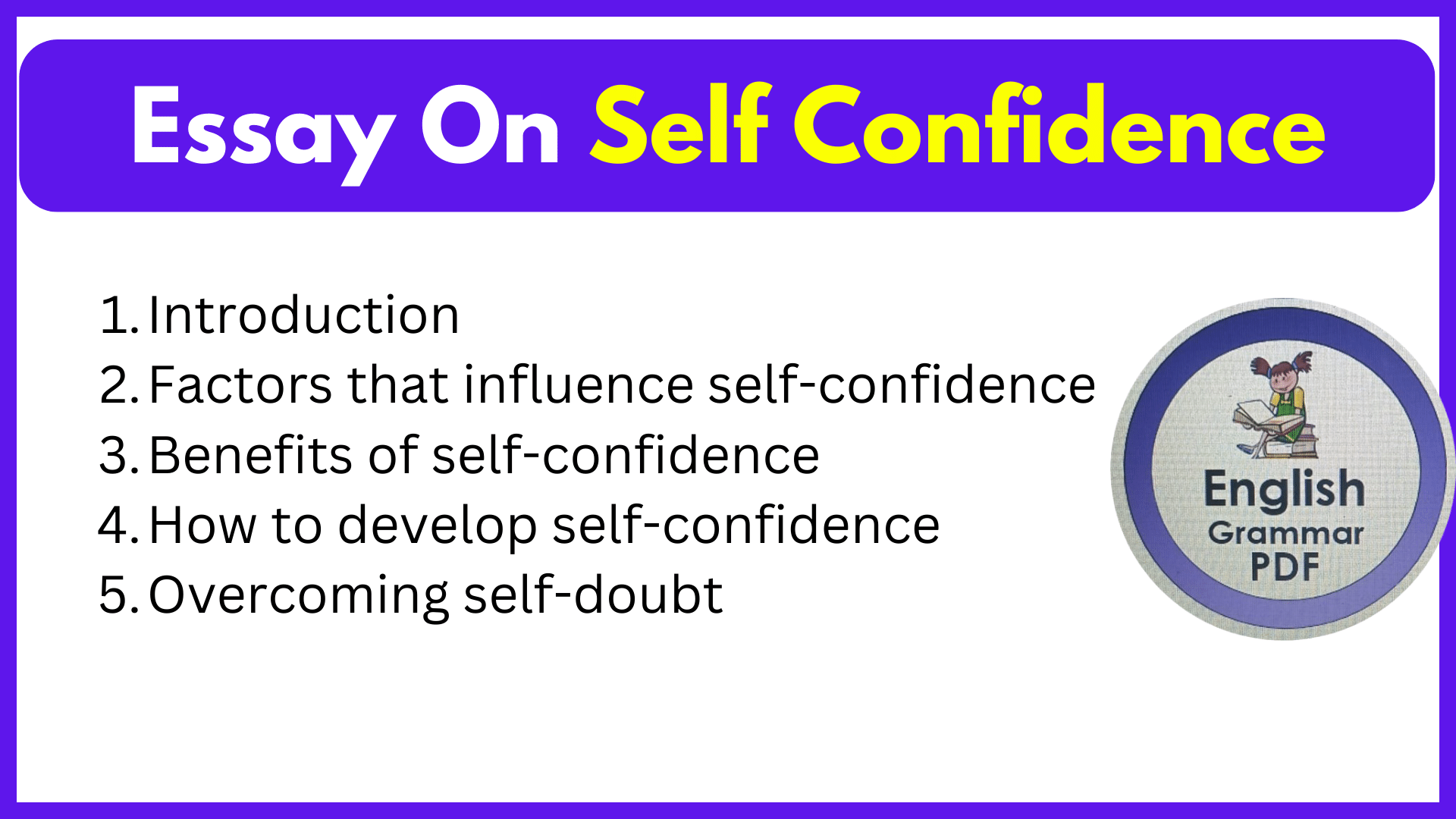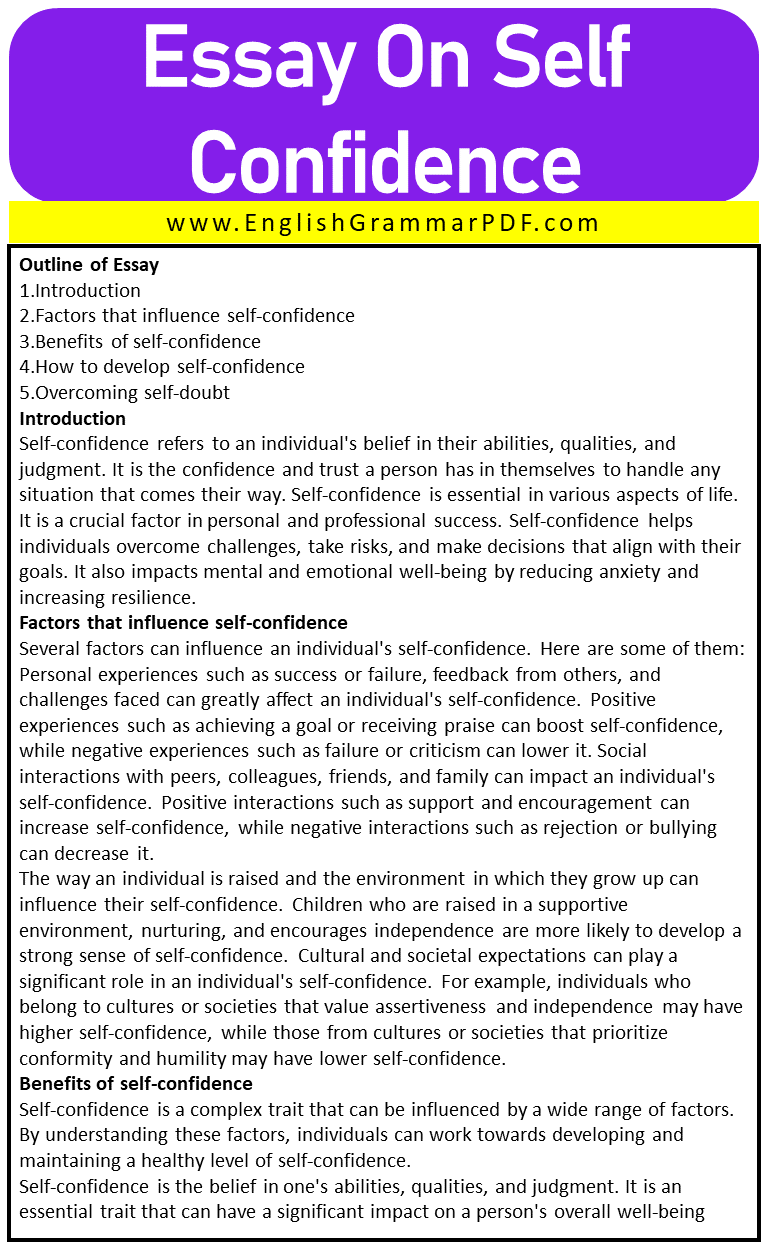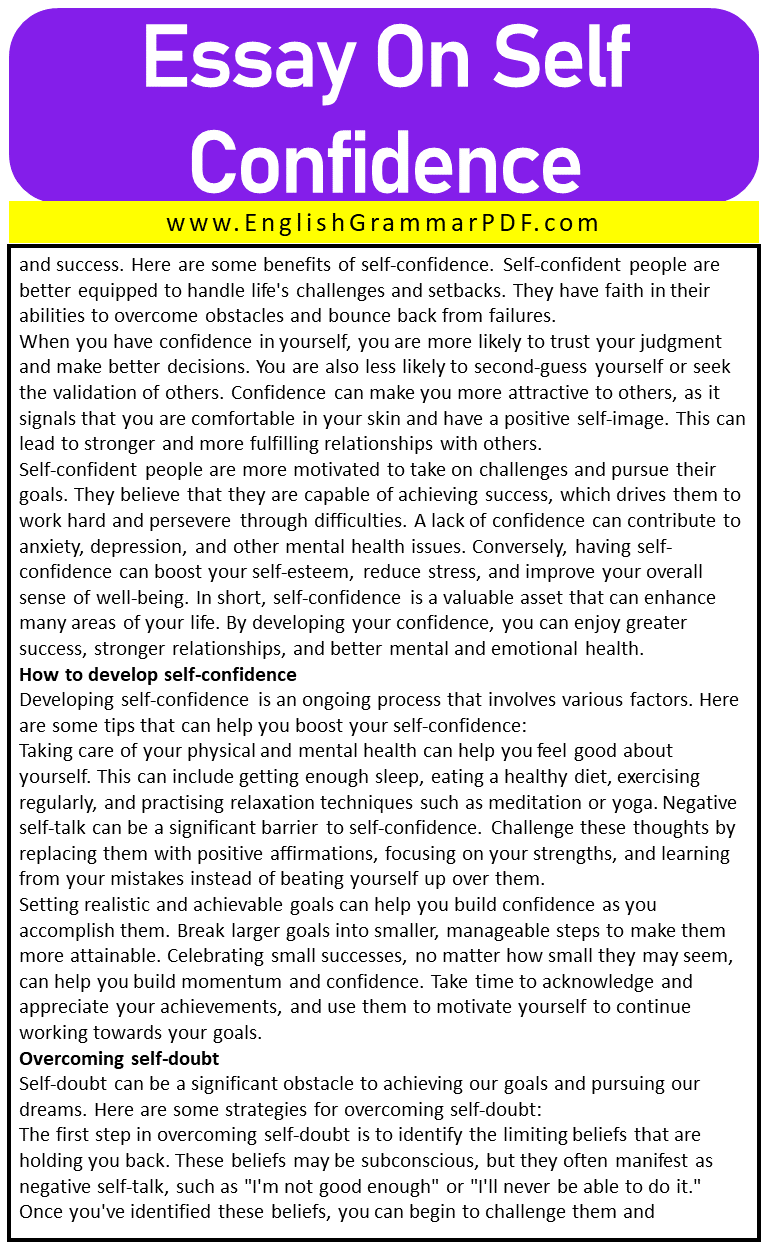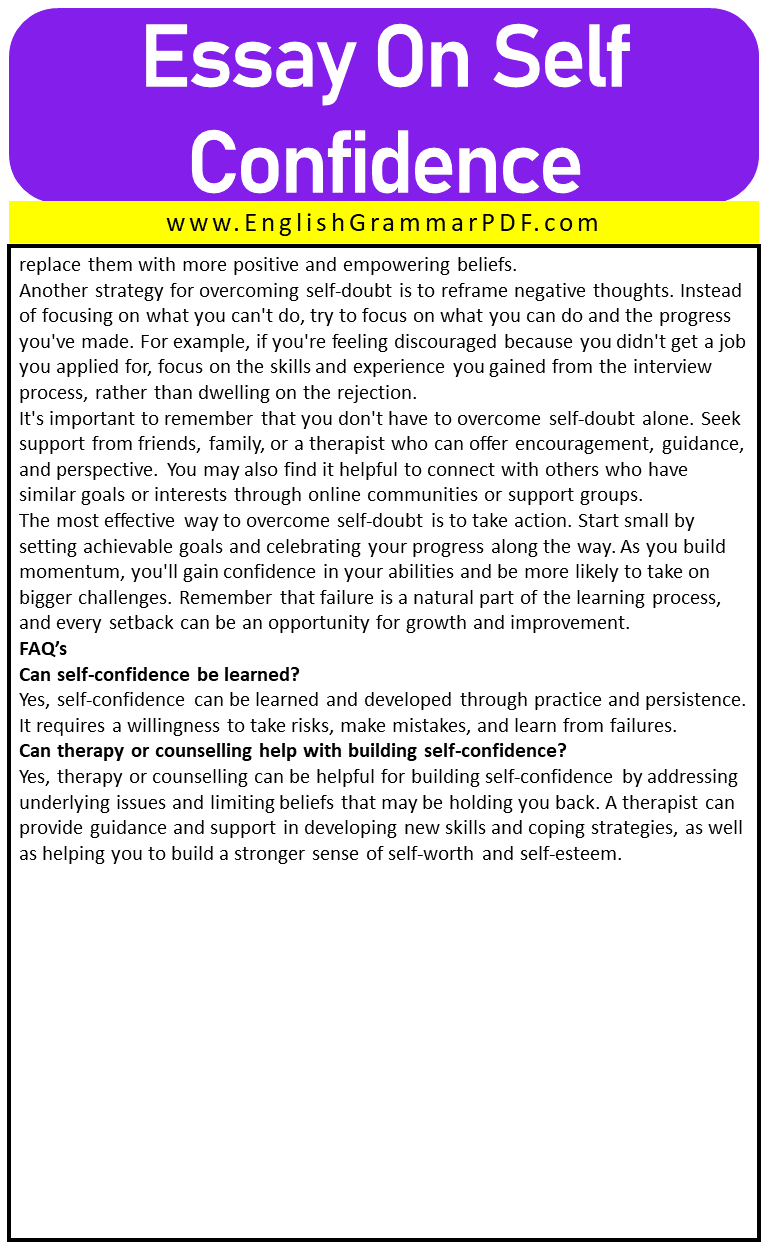Essay On Self Confidence
Outline of Essay
- Introduction
- Factors that influence self-confidence
- Benefits of self-confidence
- How to develop self-confidence
- Overcoming self-doubt
Introduction
Self-confidence refers to an individual’s belief in their abilities, qualities, and judgment. It is the confidence and trust a person has in themselves to handle any situation that comes their way. Self-confidence is essential in various aspects of life. It is a crucial factor in personal and professional success. Self-confidence helps individuals overcome challenges, take risks, and make decisions that align with their goals. It also impacts mental and emotional well-being by reducing anxiety and increasing resilience.
Factors that influence self-confidence
Several factors can influence an individual’s self-confidence. Here are some of them:
Personal experiences such as success or failure, feedback from others, and challenges faced can greatly affect an individual’s self-confidence. Positive experiences such as achieving a goal or receiving praise can boost self-confidence, while negative experiences such as failure or criticism can lower it. Social interactions with peers, colleagues, friends, and family can impact an individual’s self-confidence. Positive interactions such as support and encouragement can increase self-confidence, while negative interactions such as rejection or bullying can decrease it.
The way an individual is raised and the environment in which they grow up can influence their self-confidence. Children who are raised in a supportive environment, nurturing, and encourages independence are more likely to develop a strong sense of self-confidence. Cultural and societal expectations can play a significant role in an individual’s self-confidence. For example, individuals who belong to cultures or societies that value assertiveness and independence may have higher self-confidence, while those from cultures or societies that prioritize conformity and humility may have lower self-confidence.
Benefits of self-confidence
Self-confidence is a complex trait that can be influenced by a wide range of factors. By understanding these factors, individuals can work towards developing and maintaining a healthy level of self-confidence.
Self-confidence is the belief in one’s abilities, qualities, and judgment. It is an essential trait that can have a significant impact on a person’s overall well-being and success. Here are some benefits of self-confidence. Self-confident people are better equipped to handle life’s challenges and setbacks. They have faith in their abilities to overcome obstacles and bounce back from failures.
When you have confidence in yourself, you are more likely to trust your judgment and make better decisions. You are also less likely to second-guess yourself or seek the validation of others. Confidence can make you more attractive to others, as it signals that you are comfortable in your skin and have a positive self-image. This can lead to stronger and more fulfilling relationships with others.
Self-confident people are more motivated to take on challenges and pursue their goals. They believe that they are capable of achieving success, which drives them to work hard and persevere through difficulties. A lack of confidence can contribute to anxiety, depression, and other mental health issues. Conversely, having self-confidence can boost your self-esteem, reduce stress, and improve your overall sense of well-being. In short, self-confidence is a valuable asset that can enhance many areas of your life. By developing your confidence, you can enjoy greater success, stronger relationships, and better mental and emotional health.
How to develop self-confidence
Developing self-confidence is an ongoing process that involves various factors. Here are some tips that can help you boost your self-confidence:
Taking care of your physical and mental health can help you feel good about yourself. This can include getting enough sleep, eating a healthy diet, exercising regularly, and practising relaxation techniques such as meditation or yoga. Negative self-talk can be a significant barrier to self-confidence. Challenge these thoughts by replacing them with positive affirmations, focusing on your strengths, and learning from your mistakes instead of beating yourself up over them.
Setting realistic and achievable goals can help you build confidence as you accomplish them. Break larger goals into smaller, manageable steps to make them more attainable. Celebrating small successes, no matter how small they may seem, can help you build momentum and confidence. Take time to acknowledge and appreciate your achievements, and use them to motivate yourself to continue working towards your goals.
Overcoming self-doubt
Self-doubt can be a significant obstacle to achieving our goals and pursuing our dreams. Here are some strategies for overcoming self-doubt:
The first step in overcoming self-doubt is to identify the limiting beliefs that are holding you back. These beliefs may be subconscious, but they often manifest as negative self-talk, such as “I’m not good enough” or “I’ll never be able to do it.” Once you’ve identified these beliefs, you can begin to challenge them and replace them with more positive and empowering beliefs.
Another strategy for overcoming self-doubt is to reframe negative thoughts. Instead of focusing on what you can’t do, try to focus on what you can do and the progress you’ve made. For example, if you’re feeling discouraged because you didn’t get a job you applied for, focus on the skills and experience you gained from the interview process, rather than dwelling on the rejection.
It’s important to remember that you don’t have to overcome self-doubt alone. Seek support from friends, family, or a therapist who can offer encouragement, guidance, and perspective. You may also find it helpful to connect with others who have similar goals or interests through online communities or support groups.
The most effective way to overcome self-doubt is to take action. Start small by setting achievable goals and celebrating your progress along the way. As you build momentum, you’ll gain confidence in your abilities and be more likely to take on bigger challenges. Remember that failure is a natural part of the learning process, and every setback can be an opportunity for growth and improvement.
FAQ’s
Can self-confidence be learned?
Yes, self-confidence can be learned and developed through practice and persistence. It requires a willingness to take risks, make mistakes, and learn from failures.
Can therapy or counselling help with building self-confidence?
Yes, therapy or counselling can be helpful for building self-confidence by addressing underlying issues and limiting beliefs that may be holding you back. A therapist can provide guidance and support in developing new skills and coping strategies, as well as helping you to build a stronger sense of self-worth and self-esteem.
Explore More Essays:
Download the PDF of Essay:






